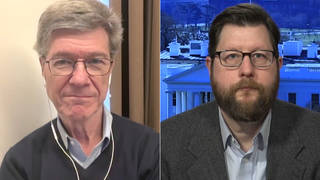
Related
Guests
- Jules LobelVice President of the New York-based Center for Constitutional Rights. He is also Professor of Law at the University of Pittsburgh.
Thousands of additional security forces have been brought into Pittsburgh ahead of the G-20, and tall steel fencing now runs along the the convention center in this former steel town. On Tuesday, a federal judge ruled against two protest groups who accused the Pittsburgh police of harassment. Seeds of Peace and Three Rivers Climate Convergence claim the police used illegal searches, vehicle seizures, raids and detentions to discourage them from taking part in protests later this week. [includes rush transcript]
Transcript
ANJALI KAMAT:
Thousands of additional security forces have been brought into Pittsburgh ahead of the G-20, and tall steel fencing now runs along the convention center in this former steel town.
On Tuesday, a federal judge ruled against two protest groups who accused the Pittsburgh police of harassment. Seeds of Peace and Three Rivers Climate Convergence claim the police used illegal searches, vehicle seizures, raids and detentions to discourage them from taking part in protests later this week. Seeds of Peace provides medical care and food to protest groups.
AMY GOODMAN:
Judge Gary Lancaster ruled on Tuesday that the two groups suffered no, quote, “irreparable harm” and added he would not stop the city from conducting further searches or detaining members of the groups.
Well, we’re joined now from Pittsburgh by Jules Lobel, the vice president of the Center for Constitutional Rights, also professor of law at the University of Pittsburgh and is representing both groups in court.
Welcome to Democracy Now!, Jules Lobel. Lay out this issue and what the judge ruled.
JULES LOBEL:
Well, what we’ve witnessed in Pittsburgh over the last week is really systematic repression against a number of these environmental groups and their supporters.
The Three Rivers Climate Convergence has been attempting to engage in what they call a “sustainability fair” to demonstrate that there’s an alternative to the economic policies and environmental policies that the G-20 countries have put forward. We had to go to court just to get them a permit in Point State Park and then in Schenley Park to engage in that fair. But key to that is an infrastructure where they show that they could provide free meals to people, they can set up demonstration kitchens, and to show that they could really sustain themselves without the use of the environmentally devastating policies. In doing so, they brought in a number of groups — one was Seeds of Peace — which brought in buses from out of town, which would cook food and provide these services for their fair.
The police have engaged in a clear pattern of harassment, intimidation, really trying to shut this group’s operation down. First, they towed their bus, on which they do — which they use for their cooking, and impounded it, because they parked apparently more than twelve inches from the curb. If they were to do that for every car and bus that parks more than twelve inches in Pittsburgh, the pounds would be overflowing.
Then, when they got their bus back, they moved to a place where the — with the owner’s permission, or the tenant’s permission, they were able to park off the street and have a whole lot to engage in their activities. The police used massive force, with semi-automatic rifles, searching, searching that property, barging in, found nothing.
Then they later detained some of the activists who were just walking on the street. They detained them for over an hour, apparently for loitering, and then let them go.
Finally, they sent a building inspector, and they pressured the owner, so that the owner, given this kind of police presence and pressure, said, “You have to move.” As soon as the groups moved, the police followed them, and within one or two minutes of getting to the next place, where another owner had let them stay in a vacant property, twenty police cars, maybe forty or fifty policemen, with sirens screeching, the lights blaring, dogs barking, jumped up, surrounded the block, blocked off the block, stayed for two hours, inspecting the bus, and gave them a traffic citation for going onto the curb in order to get into the school property. And apparently they needed some kind of license that they said they didn’t have, although they’ve driven the bus for years without ever having this license.
I understand that even after our case was filed and the judge decided it, they moved now to a church on the north side, where the police again followed them and harassed them. This is a clear pattern of harassment, trying to shut this dissent, these protests, these activities down. And we tried to sue in court. Unfortunately, the judge, you know, I think affected by the G-20 activities, by the feeling that he couldn’t interfere with police activities, ignored this clear evidence of harassment.
AMY GOODMAN:
Well, Jules Lobel, I want to thank you for joining us. And we’re going to continue to follow what happens with the protests outside the G-20 summit that’s taking place in Pittsburgh. Jules Lobel, vice president of the New York-based Center for Constitutional Rights, he lives in Pittsburgh. He’s a professor of law at the University of Pittsburgh.












Media Options